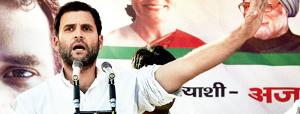Back in 1990, when the Mandal Commission’s acceptance by the V P Singh government was redrawing the political constellation of Uttar Pradesh and much of North India, Rajiv Gandhi gave an important speech in the Lok Sabha. Constantly interrupted and marked by some of the most barbed exchanges between a Prime Minister and a Leader of Opposition, it was one of the two most important speeches of his career – the other being the one in 1985 at the Congress Centenary celebration in Mumbai where he talked of vested interests and power brokers having taken over the party.
Reading his speech on caste now, is especially poignant given that the vocabulary of caste has assumed such central casting in Rahul Gandhi’s electoral campaign in Uttar Pradesh as the Congress wrestles to regain ground from two parties that are essentially the by-products of the political churning engendered by the symbolism of Mandal: the Samajwadi Party and, to a lesser extent, the BSP.
Vehemently opposed to opening the Pandora’s box of caste entitlements Rajiv charged V P Singh with taking “the the country to the edge of caste wars” arguing that this was no different from the British policy of divide and rule. He conceded that “the reality is that caste counts for a tremendous amount” but argued that the goal must be to create a casteless society.
Twenty two years after Rajiv railed against the dead-end of casteist formulas, Rahul Gandhi’s campaign in Uttar Pradesh has to a large extent focussed on the lowest common denominator of UP’s caste combinations.
The Congress calculation is something like this: if you can get the Kurmis to break from the OBC bandwagon, some of the Muslims to come back to your fold and some upper caste votes, then the party will be back in business. Hence, the elevation of former Samajwadi Party leader Beni Prasad Verma in the Congress pecking order, the constant rhetoric on uplifting the most backward communities and the shrill insistence on quotas for Muslims, exemplified by Salman Khurshids’ extraordinary defiance of the Election Commission.
Sure, there is talk of development and progress too in the bulk of Rahul Gandhi’s 130 election rallies so far. Essentially painting the SP’s cycle and the BSP’s elephant as symbols of the same corrupt political order, he has tried to run a campaign for change, except in an old fashioned mai-baap kind of way. Juxtaposing various schemes like NREGA and the proposal for minority quotas, the crux of his argument always seems to come down to one basic formulation: Look, I go to your homes, I hold your hands, elect my people and I will protect you.
This touching faith in the old Congress template of a benevolent-protector-of-the-weak kind of politician is backed up by hard-headed caste arithmetic with over a 100 OBC and MBC candidates in the Congress list. Witness the rather crude reference to Sam Pitroda’s caste and his family’s credential in such matters. As Mr Gandhi told an election rally, “When Rajiv Gandhi thought of bringing mobile phones to India, do you know who brought them? Sam Pitroda, who is a Vishkarma, “Barahi” (carpenter).”
Now, caste arithmetic has always been at the heart of political powerplay in India. The Congress itself ruled Gujarat until the 1980s on the back of the KHAM (Kshatriya-Harijan-Adivasi-Muslim) coalition, Charan Singh’s AJGAR (Ahir-Jat-Gujjar-Rajput) combination changed the politics of Uttar Pradesh in the 1970s, Lalu Yadav drove Bihar to the ground on the back of his M-Y (Muslim-Yadav) equation.
But it is one thing to factor in caste combinations in selecting candidates or ministers, it is quite another to build an entire public discourse on the basis of caste. This is the one bridge that Nehru, Indira and Rajiv chose not to cross, despite pandering to cynical caste calculations in practise. Even Indira Gandhi in 1980 had the slogan ‘na jaat par, na paat par’ [neither on caste nor on creed].
Political arithmetic based on demography is the backbone of every electoral campaign but leadership is also about the vision thing. In an election that would be decisive for his future, Rahul Gandhi has chosen to take the most direct route, appealing to the baser instincts. He seems to have missed the most important trend in recent years, of a politics of aspiration and governance transcending difference, the kind of politics exemplified by people like Nitish Kumar. Perhaps he did not have a choice.
The Congress has had virtually no party machinery in UP for nearly two decades. The party’s vote-share has remained stagnant at around 8% in the last two assembly elections and its seat-share has remained in the 20s in the 403-member assembly. The upward trend in the 2009 Lok Sabha election where it won 21 seats and 18.2% of the votes, did not visibly translate into sustainable gains. So, after two years of inertia, and faced with a make-or-break election, the Congress war-room seems to have decided to pull all the stops and rediscover caste.
The trouble with this is what Rajiv Gandhi argued all those years ago. “If you believe in a casteless society, every major step you take, must be such that you move towards a casteless society. And you must avoid taking any step which takes you towards a caste-ridden society.”
If Rahul Gandhi’s gambit succeeds, the carping about his politics will cease and put him on the front-foot again for the 2014 election, but the low rhetoric now may be a defining turn. In politics what goes around, comes around.


